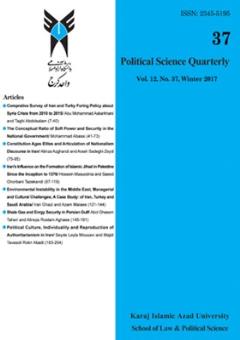Sociological study of the performance of political elites and its effect on the level of political participation of educators (case study: Ardabil province)
Subject Areas :sarhad madani 1 , rosa karampour 2 * , zahra ghasemi 3
1 - teacher of Applied Scientific University of Ardabil Province
2 - Faculty member of the Department of Social Sciences, Faculty of Social Sciences, Azad University, Tehran Branch, Tehran, Iran.
3 - Faculty member of the Department of Social Sciences, Faculty of Social Sciences, Azad University, Tehran Branch, Tehran, Iran.
Keywords: political participation, performance transparency, accountability of officials, preference of national interests over individual interests, Rulers', fight against corruption,
Abstract :
Abstract influential strata in the process of political participation and consequently effective in the all-round development of the society, therefore, knowing their preferences, orientations and satisfaction with the performance of political elites is of great importance. Is. In this research, a survey method was used, SPSS software was used for data analysis, Cronbach's alpha test was used for the reliability of the questionnaire, and face validity was used for its validity. The normality of the data of the research variables was confirmed by the Kolmogorov-Smirnov test. The statistical population is 16,300 people of Ardabil province and the size of the statistical sample was estimated to be 380 people according to Cochran's formula. In this research, simple and stratified random sampling methods were used. The theoretical framework of the research was adapted from the theories of Huntington, Nelson and Lipsett. Research hypotheses were measured using Pearson's test, and linear regression analysis and path analysis were used using spss software to measure the empirical model of the research. Based on the results obtained, there is a significant relationship between the variables of transparency of officials' performance, accountability of officials, priority of national interests, fight against corruption, political trust, actions of rulers to improve social services and actions of political elites for political development with political participation of educators.

